Entrepreneurship & Small Business: UK Economy and Venture Analysis
VerifiedAdded on 2020/10/23
|18
|6141
|420
Report
AI Summary
This report delves into the multifaceted world of entrepreneurship and small businesses, beginning with an introduction to the concept and its significance. It explores various types of entrepreneurial ventures, including small, social, scalable, large, private, public, and trading enterprises, highlighting their distinct characteristics and objectives. The report then compares and contrasts these ventures, examining their similarities and differences in terms of objectives, ownership, function, and infrastructure. A significant portion of the report is dedicated to analyzing the impact of micro and small businesses on the UK economy, emphasizing their crucial role. It further investigates the importance of small, medium, and micro-scale businesses, and identifies the traits, skills, and characteristics of successful entrepreneurs. The report also examines how entrepreneurial personalities influence motivation and mindsets, and it determines the backgrounds and experiences that can either hinder or foster entrepreneurship. The report concludes with a summary of the key findings and a list of references.

Entrepreneurship & small
business
business
Paraphrase This Document
Need a fresh take? Get an instant paraphrase of this document with our AI Paraphraser
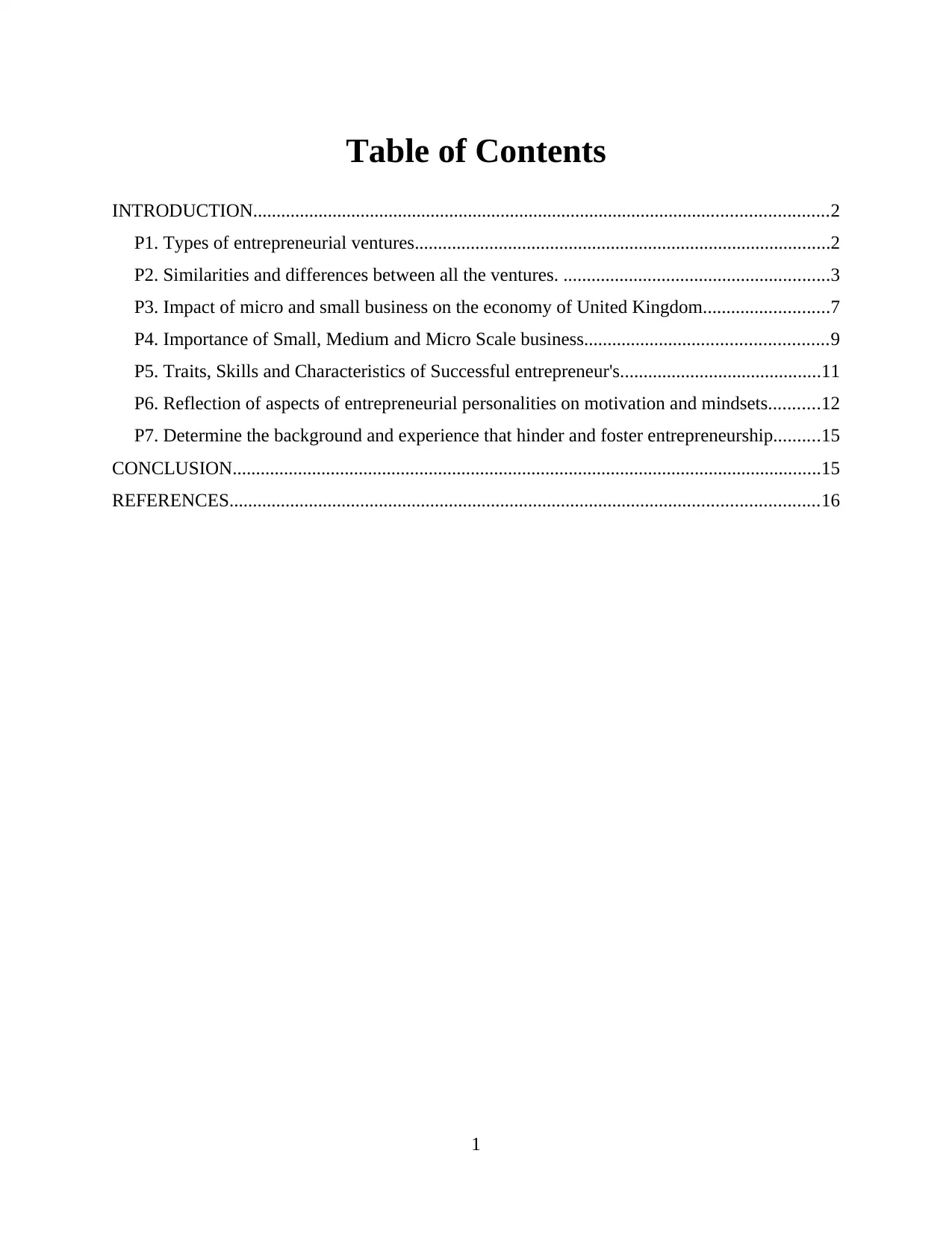
Table of Contents
INTRODUCTION...........................................................................................................................2
P1. Types of entrepreneurial ventures.........................................................................................2
P2. Similarities and differences between all the ventures. .........................................................3
P3. Impact of micro and small business on the economy of United Kingdom...........................7
P4. Importance of Small, Medium and Micro Scale business....................................................9
P5. Traits, Skills and Characteristics of Successful entrepreneur's...........................................11
P6. Reflection of aspects of entrepreneurial personalities on motivation and mindsets...........12
P7. Determine the background and experience that hinder and foster entrepreneurship..........15
CONCLUSION..............................................................................................................................15
REFERENCES..............................................................................................................................16
1
INTRODUCTION...........................................................................................................................2
P1. Types of entrepreneurial ventures.........................................................................................2
P2. Similarities and differences between all the ventures. .........................................................3
P3. Impact of micro and small business on the economy of United Kingdom...........................7
P4. Importance of Small, Medium and Micro Scale business....................................................9
P5. Traits, Skills and Characteristics of Successful entrepreneur's...........................................11
P6. Reflection of aspects of entrepreneurial personalities on motivation and mindsets...........12
P7. Determine the background and experience that hinder and foster entrepreneurship..........15
CONCLUSION..............................................................................................................................15
REFERENCES..............................................................................................................................16
1
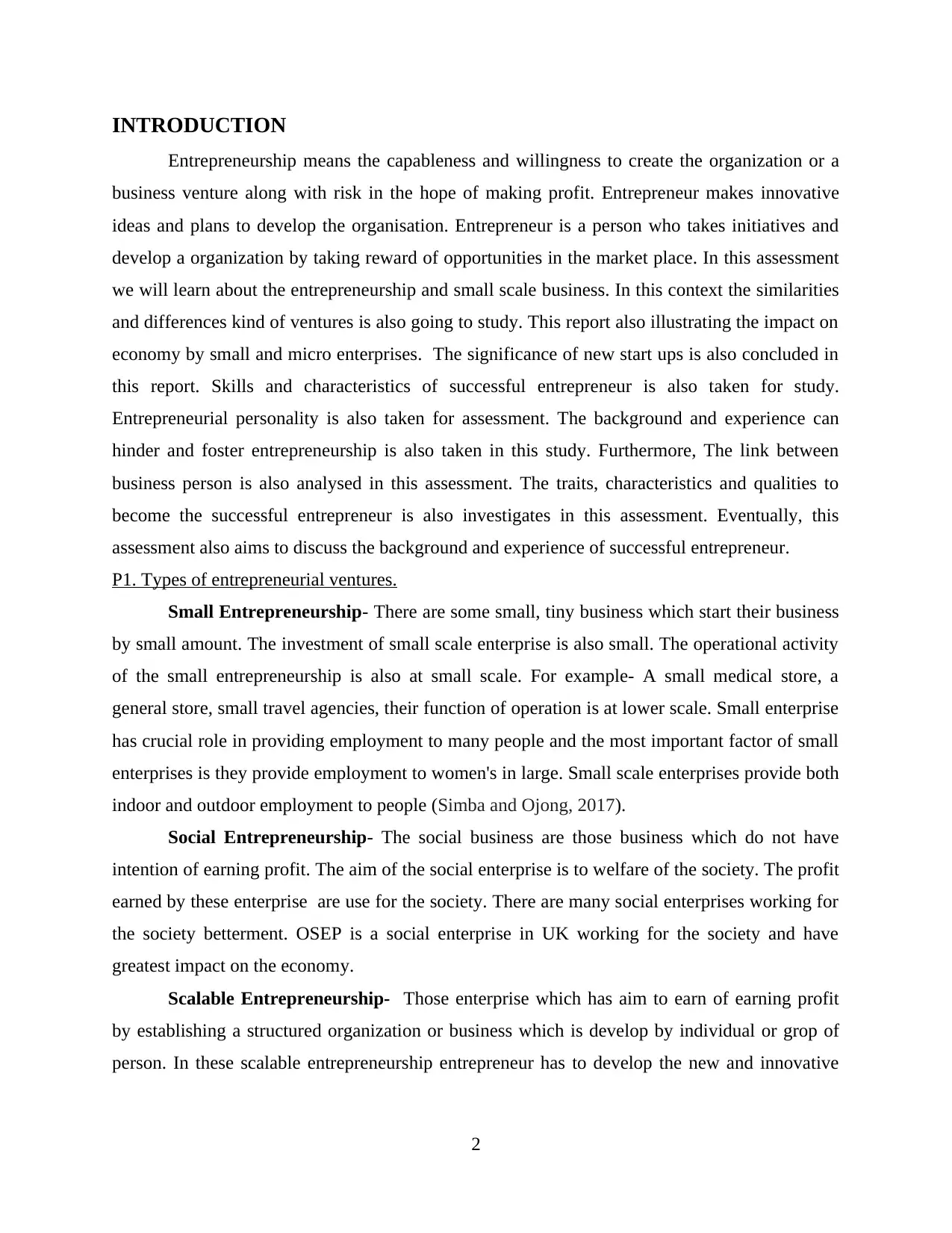
INTRODUCTION
Entrepreneurship means the capableness and willingness to create the organization or a
business venture along with risk in the hope of making profit. Entrepreneur makes innovative
ideas and plans to develop the organisation. Entrepreneur is a person who takes initiatives and
develop a organization by taking reward of opportunities in the market place. In this assessment
we will learn about the entrepreneurship and small scale business. In this context the similarities
and differences kind of ventures is also going to study. This report also illustrating the impact on
economy by small and micro enterprises. The significance of new start ups is also concluded in
this report. Skills and characteristics of successful entrepreneur is also taken for study.
Entrepreneurial personality is also taken for assessment. The background and experience can
hinder and foster entrepreneurship is also taken in this study. Furthermore, The link between
business person is also analysed in this assessment. The traits, characteristics and qualities to
become the successful entrepreneur is also investigates in this assessment. Eventually, this
assessment also aims to discuss the background and experience of successful entrepreneur.
P1. Types of entrepreneurial ventures.
Small Entrepreneurship- There are some small, tiny business which start their business
by small amount. The investment of small scale enterprise is also small. The operational activity
of the small entrepreneurship is also at small scale. For example- A small medical store, a
general store, small travel agencies, their function of operation is at lower scale. Small enterprise
has crucial role in providing employment to many people and the most important factor of small
enterprises is they provide employment to women's in large. Small scale enterprises provide both
indoor and outdoor employment to people (Simba and Ojong, 2017).
Social Entrepreneurship- The social business are those business which do not have
intention of earning profit. The aim of the social enterprise is to welfare of the society. The profit
earned by these enterprise are use for the society. There are many social enterprises working for
the society betterment. OSEP is a social enterprise in UK working for the society and have
greatest impact on the economy.
Scalable Entrepreneurship- Those enterprise which has aim to earn of earning profit
by establishing a structured organization or business which is develop by individual or grop of
person. In these scalable entrepreneurship entrepreneur has to develop the new and innovative
2
Entrepreneurship means the capableness and willingness to create the organization or a
business venture along with risk in the hope of making profit. Entrepreneur makes innovative
ideas and plans to develop the organisation. Entrepreneur is a person who takes initiatives and
develop a organization by taking reward of opportunities in the market place. In this assessment
we will learn about the entrepreneurship and small scale business. In this context the similarities
and differences kind of ventures is also going to study. This report also illustrating the impact on
economy by small and micro enterprises. The significance of new start ups is also concluded in
this report. Skills and characteristics of successful entrepreneur is also taken for study.
Entrepreneurial personality is also taken for assessment. The background and experience can
hinder and foster entrepreneurship is also taken in this study. Furthermore, The link between
business person is also analysed in this assessment. The traits, characteristics and qualities to
become the successful entrepreneur is also investigates in this assessment. Eventually, this
assessment also aims to discuss the background and experience of successful entrepreneur.
P1. Types of entrepreneurial ventures.
Small Entrepreneurship- There are some small, tiny business which start their business
by small amount. The investment of small scale enterprise is also small. The operational activity
of the small entrepreneurship is also at small scale. For example- A small medical store, a
general store, small travel agencies, their function of operation is at lower scale. Small enterprise
has crucial role in providing employment to many people and the most important factor of small
enterprises is they provide employment to women's in large. Small scale enterprises provide both
indoor and outdoor employment to people (Simba and Ojong, 2017).
Social Entrepreneurship- The social business are those business which do not have
intention of earning profit. The aim of the social enterprise is to welfare of the society. The profit
earned by these enterprise are use for the society. There are many social enterprises working for
the society betterment. OSEP is a social enterprise in UK working for the society and have
greatest impact on the economy.
Scalable Entrepreneurship- Those enterprise which has aim to earn of earning profit
by establishing a structured organization or business which is develop by individual or grop of
person. In these scalable entrepreneurship entrepreneur has to develop the new and innovative
2
⊘ This is a preview!⊘
Do you want full access?
Subscribe today to unlock all pages.

Trusted by 1+ million students worldwide
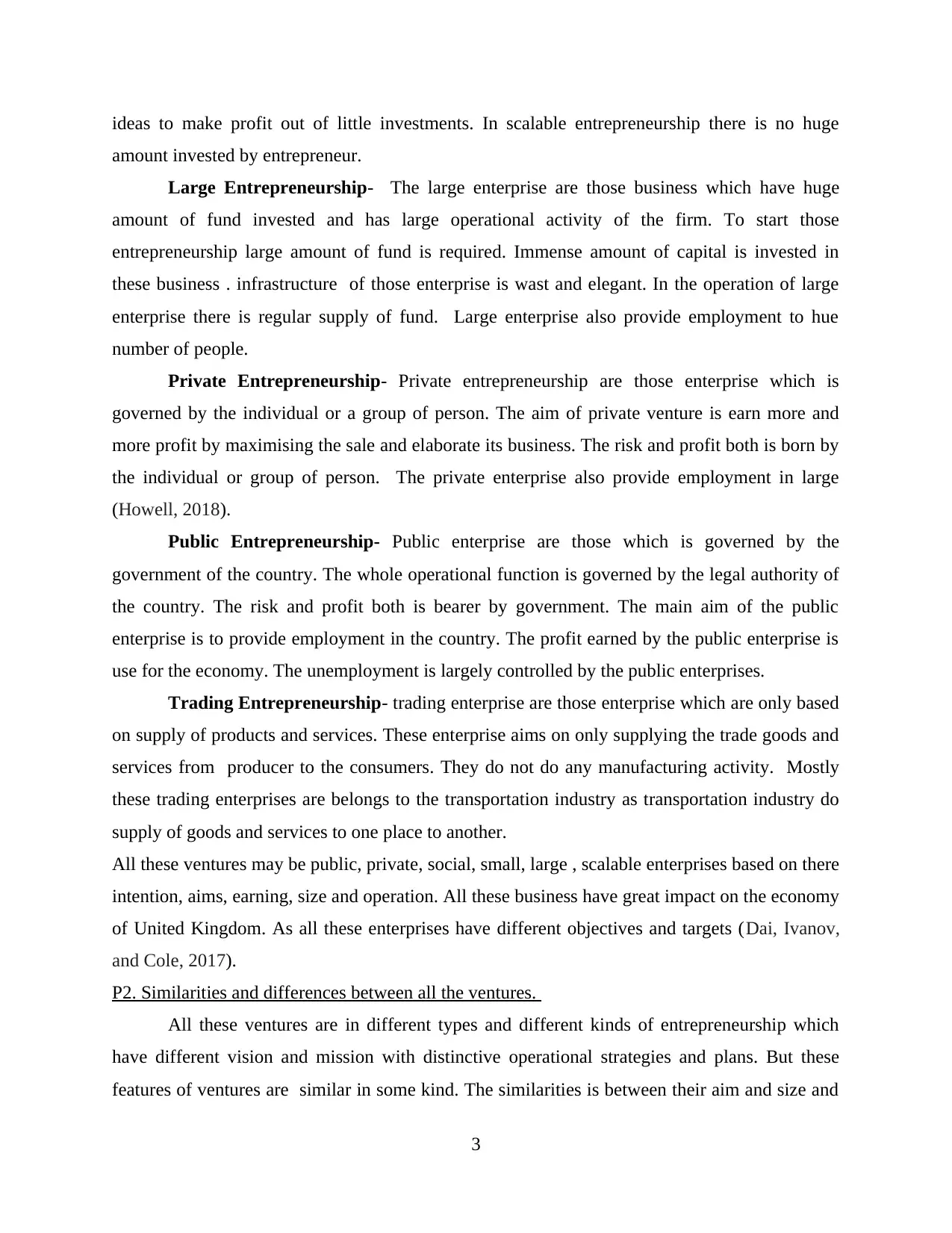
ideas to make profit out of little investments. In scalable entrepreneurship there is no huge
amount invested by entrepreneur.
Large Entrepreneurship- The large enterprise are those business which have huge
amount of fund invested and has large operational activity of the firm. To start those
entrepreneurship large amount of fund is required. Immense amount of capital is invested in
these business . infrastructure of those enterprise is wast and elegant. In the operation of large
enterprise there is regular supply of fund. Large enterprise also provide employment to hue
number of people.
Private Entrepreneurship- Private entrepreneurship are those enterprise which is
governed by the individual or a group of person. The aim of private venture is earn more and
more profit by maximising the sale and elaborate its business. The risk and profit both is born by
the individual or group of person. The private enterprise also provide employment in large
(Howell, 2018).
Public Entrepreneurship- Public enterprise are those which is governed by the
government of the country. The whole operational function is governed by the legal authority of
the country. The risk and profit both is bearer by government. The main aim of the public
enterprise is to provide employment in the country. The profit earned by the public enterprise is
use for the economy. The unemployment is largely controlled by the public enterprises.
Trading Entrepreneurship- trading enterprise are those enterprise which are only based
on supply of products and services. These enterprise aims on only supplying the trade goods and
services from producer to the consumers. They do not do any manufacturing activity. Mostly
these trading enterprises are belongs to the transportation industry as transportation industry do
supply of goods and services to one place to another.
All these ventures may be public, private, social, small, large , scalable enterprises based on there
intention, aims, earning, size and operation. All these business have great impact on the economy
of United Kingdom. As all these enterprises have different objectives and targets (Dai, Ivanov,
and Cole, 2017).
P2. Similarities and differences between all the ventures.
All these ventures are in different types and different kinds of entrepreneurship which
have different vision and mission with distinctive operational strategies and plans. But these
features of ventures are similar in some kind. The similarities is between their aim and size and
3
amount invested by entrepreneur.
Large Entrepreneurship- The large enterprise are those business which have huge
amount of fund invested and has large operational activity of the firm. To start those
entrepreneurship large amount of fund is required. Immense amount of capital is invested in
these business . infrastructure of those enterprise is wast and elegant. In the operation of large
enterprise there is regular supply of fund. Large enterprise also provide employment to hue
number of people.
Private Entrepreneurship- Private entrepreneurship are those enterprise which is
governed by the individual or a group of person. The aim of private venture is earn more and
more profit by maximising the sale and elaborate its business. The risk and profit both is born by
the individual or group of person. The private enterprise also provide employment in large
(Howell, 2018).
Public Entrepreneurship- Public enterprise are those which is governed by the
government of the country. The whole operational function is governed by the legal authority of
the country. The risk and profit both is bearer by government. The main aim of the public
enterprise is to provide employment in the country. The profit earned by the public enterprise is
use for the economy. The unemployment is largely controlled by the public enterprises.
Trading Entrepreneurship- trading enterprise are those enterprise which are only based
on supply of products and services. These enterprise aims on only supplying the trade goods and
services from producer to the consumers. They do not do any manufacturing activity. Mostly
these trading enterprises are belongs to the transportation industry as transportation industry do
supply of goods and services to one place to another.
All these ventures may be public, private, social, small, large , scalable enterprises based on there
intention, aims, earning, size and operation. All these business have great impact on the economy
of United Kingdom. As all these enterprises have different objectives and targets (Dai, Ivanov,
and Cole, 2017).
P2. Similarities and differences between all the ventures.
All these ventures are in different types and different kinds of entrepreneurship which
have different vision and mission with distinctive operational strategies and plans. But these
features of ventures are similar in some kind. The similarities is between their aim and size and
3
Paraphrase This Document
Need a fresh take? Get an instant paraphrase of this document with our AI Paraphraser
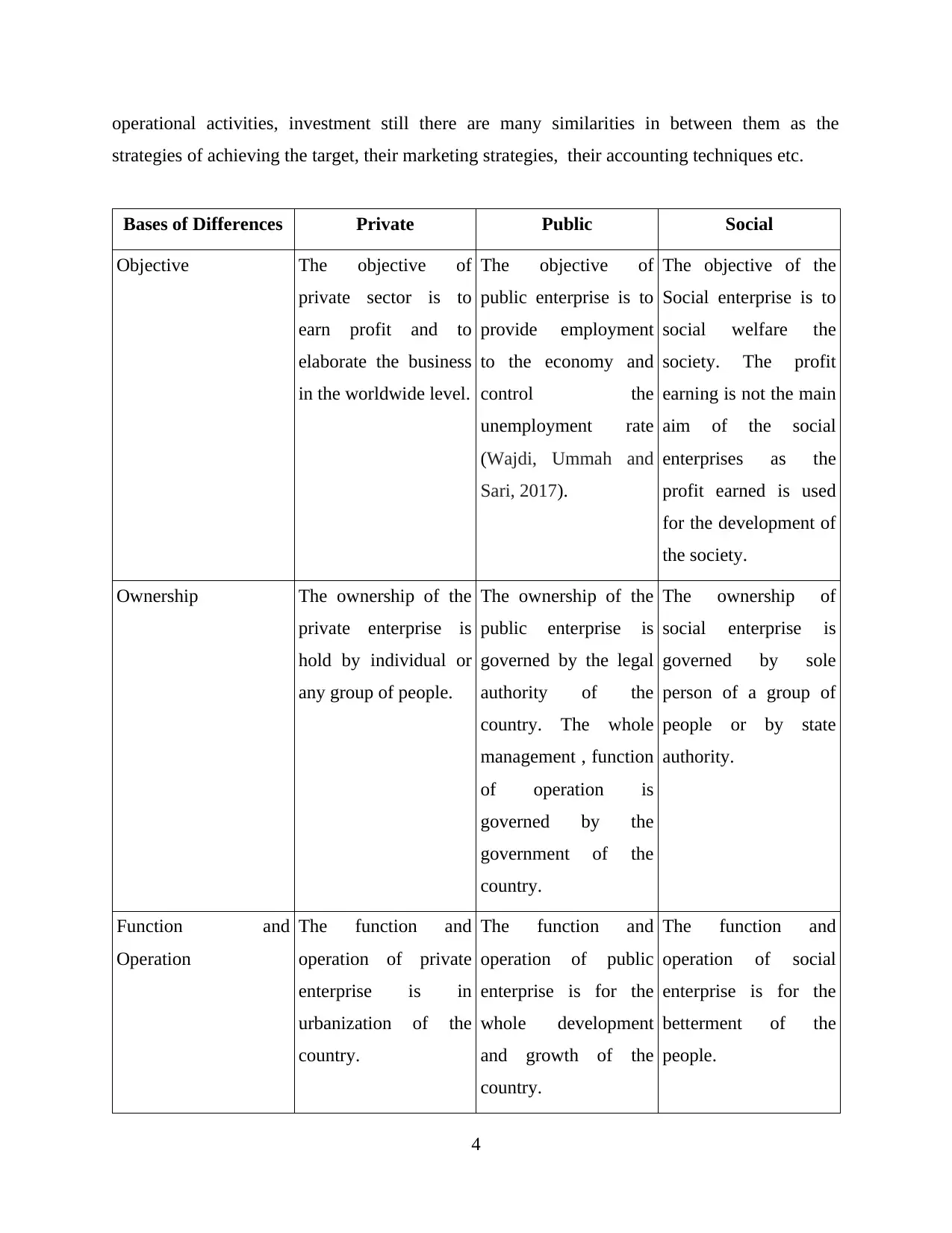
operational activities, investment still there are many similarities in between them as the
strategies of achieving the target, their marketing strategies, their accounting techniques etc.
Bases of Differences Private Public Social
Objective The objective of
private sector is to
earn profit and to
elaborate the business
in the worldwide level.
The objective of
public enterprise is to
provide employment
to the economy and
control the
unemployment rate
(Wajdi, Ummah and
Sari, 2017).
The objective of the
Social enterprise is to
social welfare the
society. The profit
earning is not the main
aim of the social
enterprises as the
profit earned is used
for the development of
the society.
Ownership The ownership of the
private enterprise is
hold by individual or
any group of people.
The ownership of the
public enterprise is
governed by the legal
authority of the
country. The whole
management , function
of operation is
governed by the
government of the
country.
The ownership of
social enterprise is
governed by sole
person of a group of
people or by state
authority.
Function and
Operation
The function and
operation of private
enterprise is in
urbanization of the
country.
The function and
operation of public
enterprise is for the
whole development
and growth of the
country.
The function and
operation of social
enterprise is for the
betterment of the
people.
4
strategies of achieving the target, their marketing strategies, their accounting techniques etc.
Bases of Differences Private Public Social
Objective The objective of
private sector is to
earn profit and to
elaborate the business
in the worldwide level.
The objective of
public enterprise is to
provide employment
to the economy and
control the
unemployment rate
(Wajdi, Ummah and
Sari, 2017).
The objective of the
Social enterprise is to
social welfare the
society. The profit
earning is not the main
aim of the social
enterprises as the
profit earned is used
for the development of
the society.
Ownership The ownership of the
private enterprise is
hold by individual or
any group of people.
The ownership of the
public enterprise is
governed by the legal
authority of the
country. The whole
management , function
of operation is
governed by the
government of the
country.
The ownership of
social enterprise is
governed by sole
person of a group of
people or by state
authority.
Function and
Operation
The function and
operation of private
enterprise is in
urbanization of the
country.
The function and
operation of public
enterprise is for the
whole development
and growth of the
country.
The function and
operation of social
enterprise is for the
betterment of the
people.
4
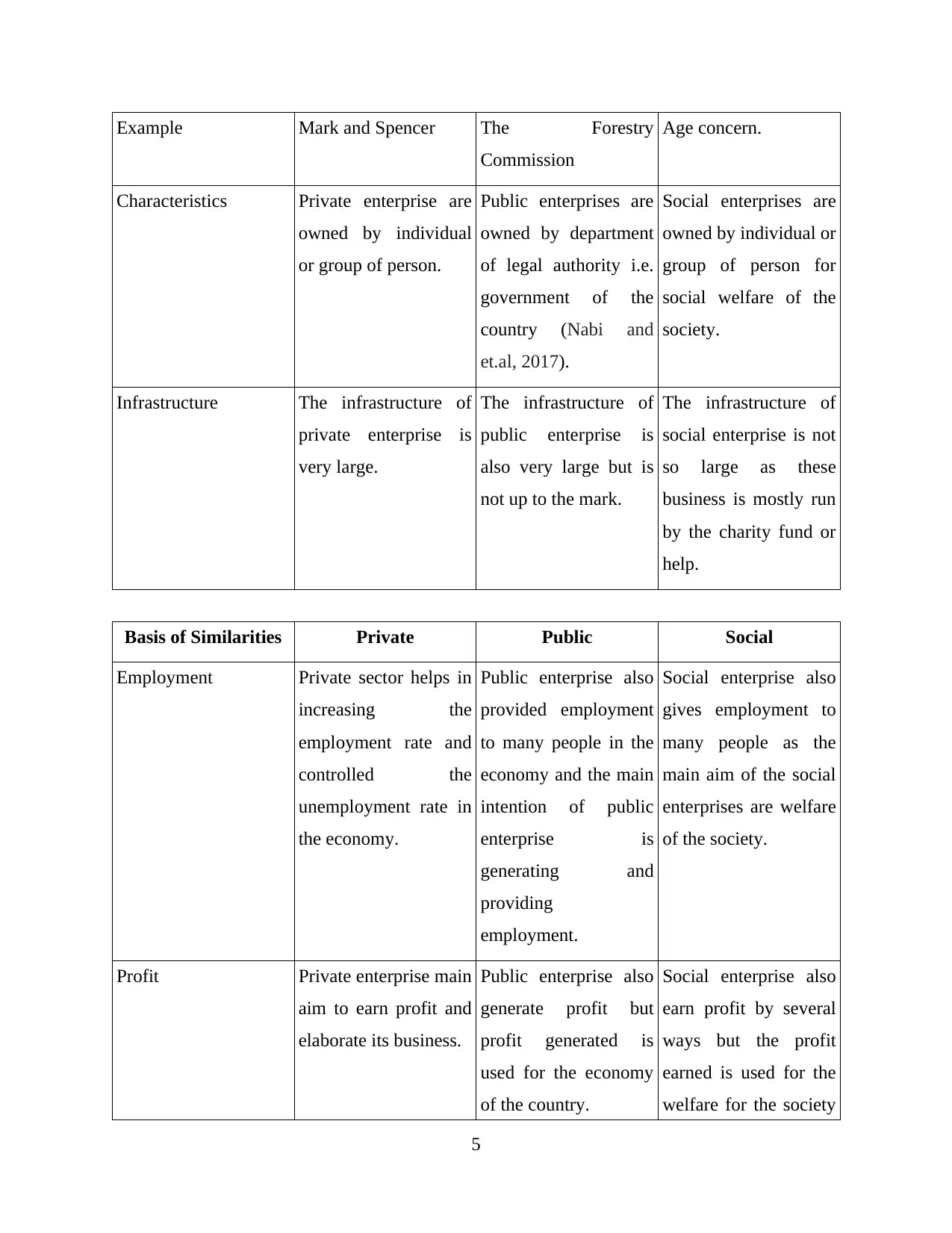
Example Mark and Spencer The Forestry
Commission
Age concern.
Characteristics Private enterprise are
owned by individual
or group of person.
Public enterprises are
owned by department
of legal authority i.e.
government of the
country (Nabi and
et.al, 2017).
Social enterprises are
owned by individual or
group of person for
social welfare of the
society.
Infrastructure The infrastructure of
private enterprise is
very large.
The infrastructure of
public enterprise is
also very large but is
not up to the mark.
The infrastructure of
social enterprise is not
so large as these
business is mostly run
by the charity fund or
help.
Basis of Similarities Private Public Social
Employment Private sector helps in
increasing the
employment rate and
controlled the
unemployment rate in
the economy.
Public enterprise also
provided employment
to many people in the
economy and the main
intention of public
enterprise is
generating and
providing
employment.
Social enterprise also
gives employment to
many people as the
main aim of the social
enterprises are welfare
of the society.
Profit Private enterprise main
aim to earn profit and
elaborate its business.
Public enterprise also
generate profit but
profit generated is
used for the economy
of the country.
Social enterprise also
earn profit by several
ways but the profit
earned is used for the
welfare for the society
5
Commission
Age concern.
Characteristics Private enterprise are
owned by individual
or group of person.
Public enterprises are
owned by department
of legal authority i.e.
government of the
country (Nabi and
et.al, 2017).
Social enterprises are
owned by individual or
group of person for
social welfare of the
society.
Infrastructure The infrastructure of
private enterprise is
very large.
The infrastructure of
public enterprise is
also very large but is
not up to the mark.
The infrastructure of
social enterprise is not
so large as these
business is mostly run
by the charity fund or
help.
Basis of Similarities Private Public Social
Employment Private sector helps in
increasing the
employment rate and
controlled the
unemployment rate in
the economy.
Public enterprise also
provided employment
to many people in the
economy and the main
intention of public
enterprise is
generating and
providing
employment.
Social enterprise also
gives employment to
many people as the
main aim of the social
enterprises are welfare
of the society.
Profit Private enterprise main
aim to earn profit and
elaborate its business.
Public enterprise also
generate profit but
profit generated is
used for the economy
of the country.
Social enterprise also
earn profit by several
ways but the profit
earned is used for the
welfare for the society
5
⊘ This is a preview!⊘
Do you want full access?
Subscribe today to unlock all pages.

Trusted by 1+ million students worldwide
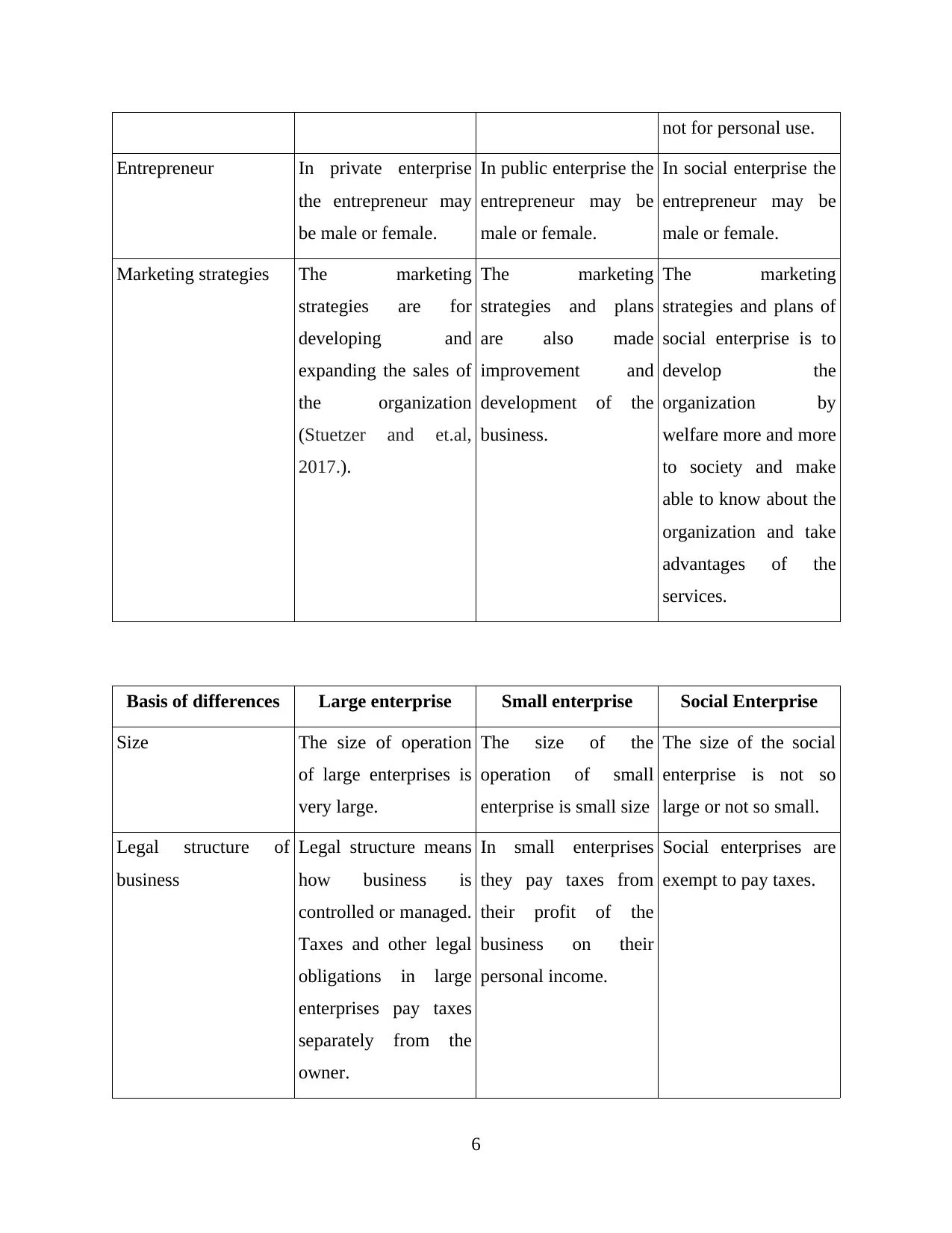
not for personal use.
Entrepreneur In private enterprise
the entrepreneur may
be male or female.
In public enterprise the
entrepreneur may be
male or female.
In social enterprise the
entrepreneur may be
male or female.
Marketing strategies The marketing
strategies are for
developing and
expanding the sales of
the organization
(Stuetzer and et.al,
2017.).
The marketing
strategies and plans
are also made
improvement and
development of the
business.
The marketing
strategies and plans of
social enterprise is to
develop the
organization by
welfare more and more
to society and make
able to know about the
organization and take
advantages of the
services.
Basis of differences Large enterprise Small enterprise Social Enterprise
Size The size of operation
of large enterprises is
very large.
The size of the
operation of small
enterprise is small size
The size of the social
enterprise is not so
large or not so small.
Legal structure of
business
Legal structure means
how business is
controlled or managed.
Taxes and other legal
obligations in large
enterprises pay taxes
separately from the
owner.
In small enterprises
they pay taxes from
their profit of the
business on their
personal income.
Social enterprises are
exempt to pay taxes.
6
Entrepreneur In private enterprise
the entrepreneur may
be male or female.
In public enterprise the
entrepreneur may be
male or female.
In social enterprise the
entrepreneur may be
male or female.
Marketing strategies The marketing
strategies are for
developing and
expanding the sales of
the organization
(Stuetzer and et.al,
2017.).
The marketing
strategies and plans
are also made
improvement and
development of the
business.
The marketing
strategies and plans of
social enterprise is to
develop the
organization by
welfare more and more
to society and make
able to know about the
organization and take
advantages of the
services.
Basis of differences Large enterprise Small enterprise Social Enterprise
Size The size of operation
of large enterprises is
very large.
The size of the
operation of small
enterprise is small size
The size of the social
enterprise is not so
large or not so small.
Legal structure of
business
Legal structure means
how business is
controlled or managed.
Taxes and other legal
obligations in large
enterprises pay taxes
separately from the
owner.
In small enterprises
they pay taxes from
their profit of the
business on their
personal income.
Social enterprises are
exempt to pay taxes.
6
Paraphrase This Document
Need a fresh take? Get an instant paraphrase of this document with our AI Paraphraser
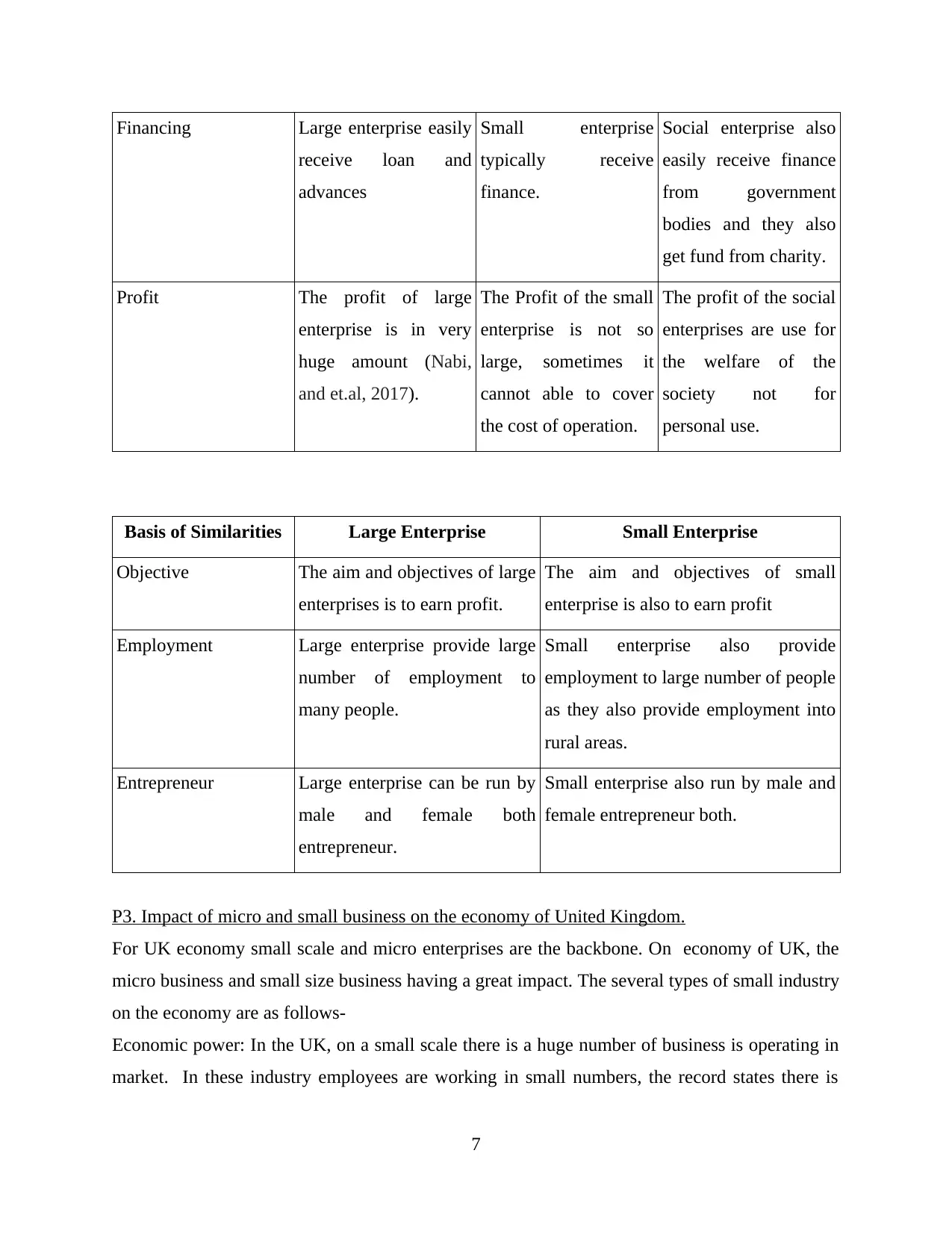
Financing Large enterprise easily
receive loan and
advances
Small enterprise
typically receive
finance.
Social enterprise also
easily receive finance
from government
bodies and they also
get fund from charity.
Profit The profit of large
enterprise is in very
huge amount (Nabi,
and et.al, 2017).
The Profit of the small
enterprise is not so
large, sometimes it
cannot able to cover
the cost of operation.
The profit of the social
enterprises are use for
the welfare of the
society not for
personal use.
Basis of Similarities Large Enterprise Small Enterprise
Objective The aim and objectives of large
enterprises is to earn profit.
The aim and objectives of small
enterprise is also to earn profit
Employment Large enterprise provide large
number of employment to
many people.
Small enterprise also provide
employment to large number of people
as they also provide employment into
rural areas.
Entrepreneur Large enterprise can be run by
male and female both
entrepreneur.
Small enterprise also run by male and
female entrepreneur both.
P3. Impact of micro and small business on the economy of United Kingdom.
For UK economy small scale and micro enterprises are the backbone. On economy of UK, the
micro business and small size business having a great impact. The several types of small industry
on the economy are as follows-
Economic power: In the UK, on a small scale there is a huge number of business is operating in
market. In these industry employees are working in small numbers, the record states there is
7
receive loan and
advances
Small enterprise
typically receive
finance.
Social enterprise also
easily receive finance
from government
bodies and they also
get fund from charity.
Profit The profit of large
enterprise is in very
huge amount (Nabi,
and et.al, 2017).
The Profit of the small
enterprise is not so
large, sometimes it
cannot able to cover
the cost of operation.
The profit of the social
enterprises are use for
the welfare of the
society not for
personal use.
Basis of Similarities Large Enterprise Small Enterprise
Objective The aim and objectives of large
enterprises is to earn profit.
The aim and objectives of small
enterprise is also to earn profit
Employment Large enterprise provide large
number of employment to
many people.
Small enterprise also provide
employment to large number of people
as they also provide employment into
rural areas.
Entrepreneur Large enterprise can be run by
male and female both
entrepreneur.
Small enterprise also run by male and
female entrepreneur both.
P3. Impact of micro and small business on the economy of United Kingdom.
For UK economy small scale and micro enterprises are the backbone. On economy of UK, the
micro business and small size business having a great impact. The several types of small industry
on the economy are as follows-
Economic power: In the UK, on a small scale there is a huge number of business is operating in
market. In these industry employees are working in small numbers, the record states there is
7
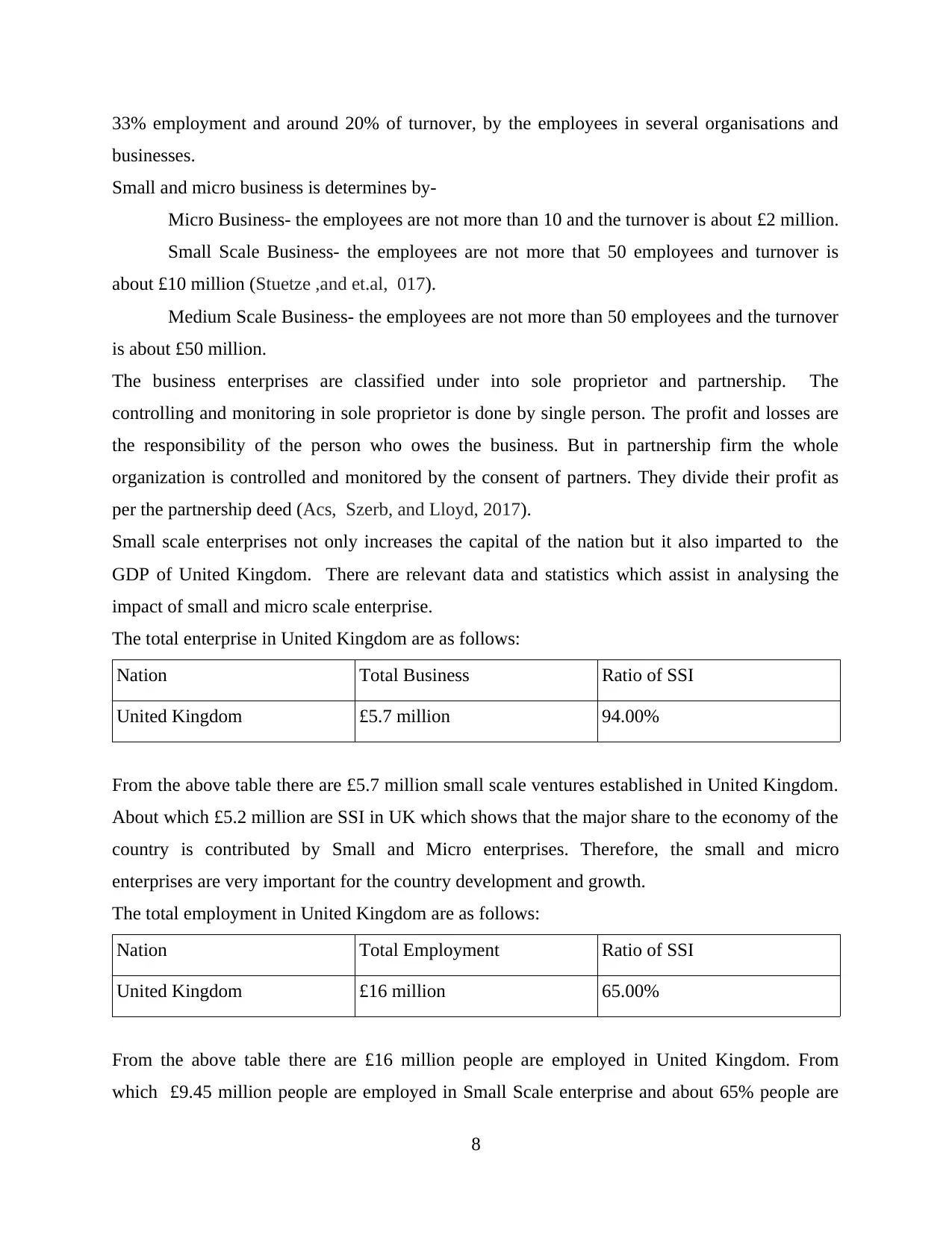
33% employment and around 20% of turnover, by the employees in several organisations and
businesses.
Small and micro business is determines by-
Micro Business- the employees are not more than 10 and the turnover is about £2 million.
Small Scale Business- the employees are not more that 50 employees and turnover is
about £10 million (Stuetze ,and et.al, 017).
Medium Scale Business- the employees are not more than 50 employees and the turnover
is about £50 million.
The business enterprises are classified under into sole proprietor and partnership. The
controlling and monitoring in sole proprietor is done by single person. The profit and losses are
the responsibility of the person who owes the business. But in partnership firm the whole
organization is controlled and monitored by the consent of partners. They divide their profit as
per the partnership deed (Acs, Szerb, and Lloyd, 2017).
Small scale enterprises not only increases the capital of the nation but it also imparted to the
GDP of United Kingdom. There are relevant data and statistics which assist in analysing the
impact of small and micro scale enterprise.
The total enterprise in United Kingdom are as follows:
Nation Total Business Ratio of SSI
United Kingdom £5.7 million 94.00%
From the above table there are £5.7 million small scale ventures established in United Kingdom.
About which £5.2 million are SSI in UK which shows that the major share to the economy of the
country is contributed by Small and Micro enterprises. Therefore, the small and micro
enterprises are very important for the country development and growth.
The total employment in United Kingdom are as follows:
Nation Total Employment Ratio of SSI
United Kingdom £16 million 65.00%
From the above table there are £16 million people are employed in United Kingdom. From
which £9.45 million people are employed in Small Scale enterprise and about 65% people are
8
businesses.
Small and micro business is determines by-
Micro Business- the employees are not more than 10 and the turnover is about £2 million.
Small Scale Business- the employees are not more that 50 employees and turnover is
about £10 million (Stuetze ,and et.al, 017).
Medium Scale Business- the employees are not more than 50 employees and the turnover
is about £50 million.
The business enterprises are classified under into sole proprietor and partnership. The
controlling and monitoring in sole proprietor is done by single person. The profit and losses are
the responsibility of the person who owes the business. But in partnership firm the whole
organization is controlled and monitored by the consent of partners. They divide their profit as
per the partnership deed (Acs, Szerb, and Lloyd, 2017).
Small scale enterprises not only increases the capital of the nation but it also imparted to the
GDP of United Kingdom. There are relevant data and statistics which assist in analysing the
impact of small and micro scale enterprise.
The total enterprise in United Kingdom are as follows:
Nation Total Business Ratio of SSI
United Kingdom £5.7 million 94.00%
From the above table there are £5.7 million small scale ventures established in United Kingdom.
About which £5.2 million are SSI in UK which shows that the major share to the economy of the
country is contributed by Small and Micro enterprises. Therefore, the small and micro
enterprises are very important for the country development and growth.
The total employment in United Kingdom are as follows:
Nation Total Employment Ratio of SSI
United Kingdom £16 million 65.00%
From the above table there are £16 million people are employed in United Kingdom. From
which £9.45 million people are employed in Small Scale enterprise and about 65% people are
8
⊘ This is a preview!⊘
Do you want full access?
Subscribe today to unlock all pages.

Trusted by 1+ million students worldwide
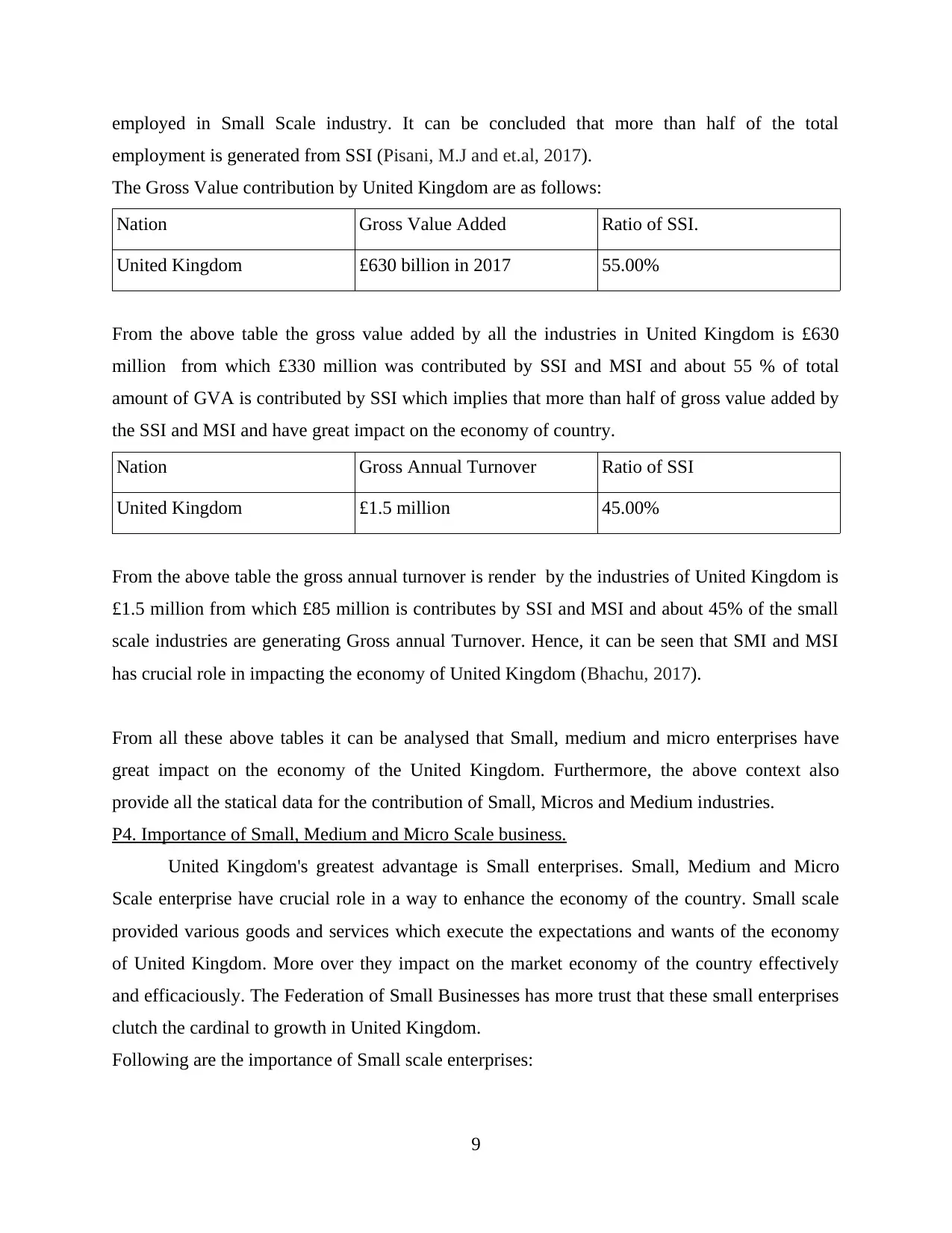
employed in Small Scale industry. It can be concluded that more than half of the total
employment is generated from SSI (Pisani, M.J and et.al, 2017).
The Gross Value contribution by United Kingdom are as follows:
Nation Gross Value Added Ratio of SSI.
United Kingdom £630 billion in 2017 55.00%
From the above table the gross value added by all the industries in United Kingdom is £630
million from which £330 million was contributed by SSI and MSI and about 55 % of total
amount of GVA is contributed by SSI which implies that more than half of gross value added by
the SSI and MSI and have great impact on the economy of country.
Nation Gross Annual Turnover Ratio of SSI
United Kingdom £1.5 million 45.00%
From the above table the gross annual turnover is render by the industries of United Kingdom is
£1.5 million from which £85 million is contributes by SSI and MSI and about 45% of the small
scale industries are generating Gross annual Turnover. Hence, it can be seen that SMI and MSI
has crucial role in impacting the economy of United Kingdom (Bhachu, 2017).
From all these above tables it can be analysed that Small, medium and micro enterprises have
great impact on the economy of the United Kingdom. Furthermore, the above context also
provide all the statical data for the contribution of Small, Micros and Medium industries.
P4. Importance of Small, Medium and Micro Scale business.
United Kingdom's greatest advantage is Small enterprises. Small, Medium and Micro
Scale enterprise have crucial role in a way to enhance the economy of the country. Small scale
provided various goods and services which execute the expectations and wants of the economy
of United Kingdom. More over they impact on the market economy of the country effectively
and efficaciously. The Federation of Small Businesses has more trust that these small enterprises
clutch the cardinal to growth in United Kingdom.
Following are the importance of Small scale enterprises:
9
employment is generated from SSI (Pisani, M.J and et.al, 2017).
The Gross Value contribution by United Kingdom are as follows:
Nation Gross Value Added Ratio of SSI.
United Kingdom £630 billion in 2017 55.00%
From the above table the gross value added by all the industries in United Kingdom is £630
million from which £330 million was contributed by SSI and MSI and about 55 % of total
amount of GVA is contributed by SSI which implies that more than half of gross value added by
the SSI and MSI and have great impact on the economy of country.
Nation Gross Annual Turnover Ratio of SSI
United Kingdom £1.5 million 45.00%
From the above table the gross annual turnover is render by the industries of United Kingdom is
£1.5 million from which £85 million is contributes by SSI and MSI and about 45% of the small
scale industries are generating Gross annual Turnover. Hence, it can be seen that SMI and MSI
has crucial role in impacting the economy of United Kingdom (Bhachu, 2017).
From all these above tables it can be analysed that Small, medium and micro enterprises have
great impact on the economy of the United Kingdom. Furthermore, the above context also
provide all the statical data for the contribution of Small, Micros and Medium industries.
P4. Importance of Small, Medium and Micro Scale business.
United Kingdom's greatest advantage is Small enterprises. Small, Medium and Micro
Scale enterprise have crucial role in a way to enhance the economy of the country. Small scale
provided various goods and services which execute the expectations and wants of the economy
of United Kingdom. More over they impact on the market economy of the country effectively
and efficaciously. The Federation of Small Businesses has more trust that these small enterprises
clutch the cardinal to growth in United Kingdom.
Following are the importance of Small scale enterprises:
9
Paraphrase This Document
Need a fresh take? Get an instant paraphrase of this document with our AI Paraphraser
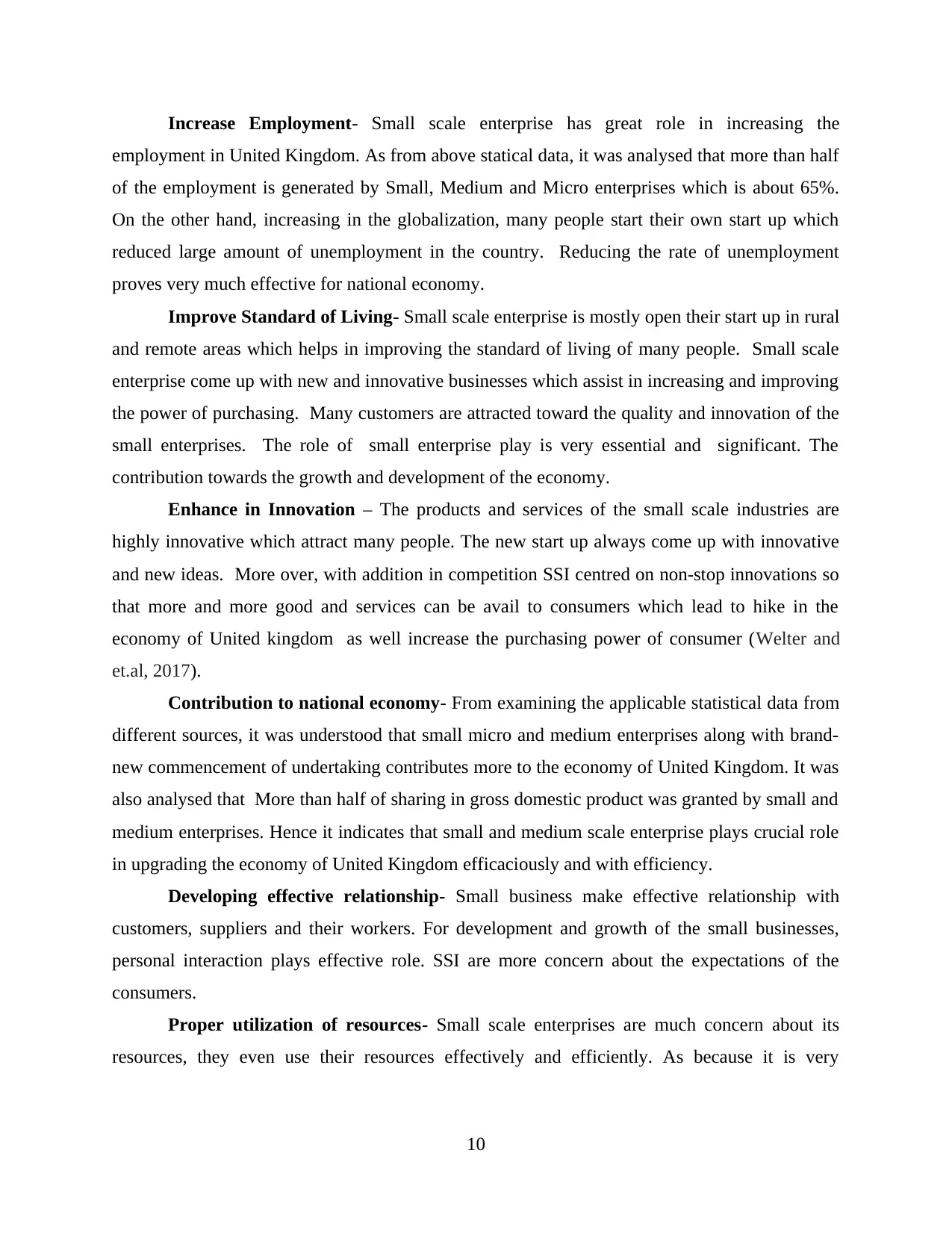
Increase Employment- Small scale enterprise has great role in increasing the
employment in United Kingdom. As from above statical data, it was analysed that more than half
of the employment is generated by Small, Medium and Micro enterprises which is about 65%.
On the other hand, increasing in the globalization, many people start their own start up which
reduced large amount of unemployment in the country. Reducing the rate of unemployment
proves very much effective for national economy.
Improve Standard of Living- Small scale enterprise is mostly open their start up in rural
and remote areas which helps in improving the standard of living of many people. Small scale
enterprise come up with new and innovative businesses which assist in increasing and improving
the power of purchasing. Many customers are attracted toward the quality and innovation of the
small enterprises. The role of small enterprise play is very essential and significant. The
contribution towards the growth and development of the economy.
Enhance in Innovation – The products and services of the small scale industries are
highly innovative which attract many people. The new start up always come up with innovative
and new ideas. More over, with addition in competition SSI centred on non-stop innovations so
that more and more good and services can be avail to consumers which lead to hike in the
economy of United kingdom as well increase the purchasing power of consumer (Welter and
et.al, 2017).
Contribution to national economy- From examining the applicable statistical data from
different sources, it was understood that small micro and medium enterprises along with brand-
new commencement of undertaking contributes more to the economy of United Kingdom. It was
also analysed that More than half of sharing in gross domestic product was granted by small and
medium enterprises. Hence it indicates that small and medium scale enterprise plays crucial role
in upgrading the economy of United Kingdom efficaciously and with efficiency.
Developing effective relationship- Small business make effective relationship with
customers, suppliers and their workers. For development and growth of the small businesses,
personal interaction plays effective role. SSI are more concern about the expectations of the
consumers.
Proper utilization of resources- Small scale enterprises are much concern about its
resources, they even use their resources effectively and efficiently. As because it is very
10
employment in United Kingdom. As from above statical data, it was analysed that more than half
of the employment is generated by Small, Medium and Micro enterprises which is about 65%.
On the other hand, increasing in the globalization, many people start their own start up which
reduced large amount of unemployment in the country. Reducing the rate of unemployment
proves very much effective for national economy.
Improve Standard of Living- Small scale enterprise is mostly open their start up in rural
and remote areas which helps in improving the standard of living of many people. Small scale
enterprise come up with new and innovative businesses which assist in increasing and improving
the power of purchasing. Many customers are attracted toward the quality and innovation of the
small enterprises. The role of small enterprise play is very essential and significant. The
contribution towards the growth and development of the economy.
Enhance in Innovation – The products and services of the small scale industries are
highly innovative which attract many people. The new start up always come up with innovative
and new ideas. More over, with addition in competition SSI centred on non-stop innovations so
that more and more good and services can be avail to consumers which lead to hike in the
economy of United kingdom as well increase the purchasing power of consumer (Welter and
et.al, 2017).
Contribution to national economy- From examining the applicable statistical data from
different sources, it was understood that small micro and medium enterprises along with brand-
new commencement of undertaking contributes more to the economy of United Kingdom. It was
also analysed that More than half of sharing in gross domestic product was granted by small and
medium enterprises. Hence it indicates that small and medium scale enterprise plays crucial role
in upgrading the economy of United Kingdom efficaciously and with efficiency.
Developing effective relationship- Small business make effective relationship with
customers, suppliers and their workers. For development and growth of the small businesses,
personal interaction plays effective role. SSI are more concern about the expectations of the
consumers.
Proper utilization of resources- Small scale enterprises are much concern about its
resources, they even use their resources effectively and efficiently. As because it is very
10
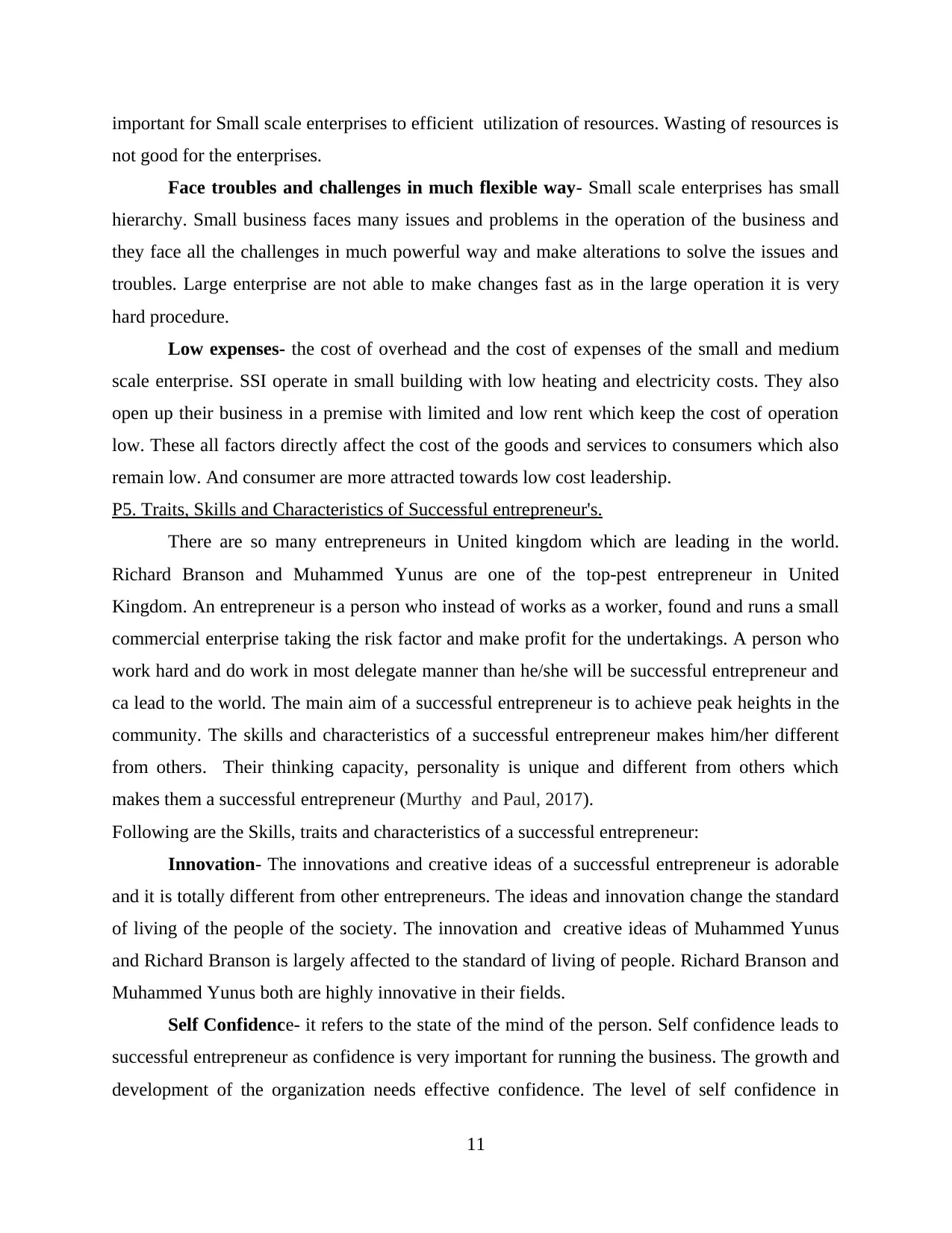
important for Small scale enterprises to efficient utilization of resources. Wasting of resources is
not good for the enterprises.
Face troubles and challenges in much flexible way- Small scale enterprises has small
hierarchy. Small business faces many issues and problems in the operation of the business and
they face all the challenges in much powerful way and make alterations to solve the issues and
troubles. Large enterprise are not able to make changes fast as in the large operation it is very
hard procedure.
Low expenses- the cost of overhead and the cost of expenses of the small and medium
scale enterprise. SSI operate in small building with low heating and electricity costs. They also
open up their business in a premise with limited and low rent which keep the cost of operation
low. These all factors directly affect the cost of the goods and services to consumers which also
remain low. And consumer are more attracted towards low cost leadership.
P5. Traits, Skills and Characteristics of Successful entrepreneur's.
There are so many entrepreneurs in United kingdom which are leading in the world.
Richard Branson and Muhammed Yunus are one of the top-pest entrepreneur in United
Kingdom. An entrepreneur is a person who instead of works as a worker, found and runs a small
commercial enterprise taking the risk factor and make profit for the undertakings. A person who
work hard and do work in most delegate manner than he/she will be successful entrepreneur and
ca lead to the world. The main aim of a successful entrepreneur is to achieve peak heights in the
community. The skills and characteristics of a successful entrepreneur makes him/her different
from others. Their thinking capacity, personality is unique and different from others which
makes them a successful entrepreneur (Murthy and Paul, 2017).
Following are the Skills, traits and characteristics of a successful entrepreneur:
Innovation- The innovations and creative ideas of a successful entrepreneur is adorable
and it is totally different from other entrepreneurs. The ideas and innovation change the standard
of living of the people of the society. The innovation and creative ideas of Muhammed Yunus
and Richard Branson is largely affected to the standard of living of people. Richard Branson and
Muhammed Yunus both are highly innovative in their fields.
Self Confidence- it refers to the state of the mind of the person. Self confidence leads to
successful entrepreneur as confidence is very important for running the business. The growth and
development of the organization needs effective confidence. The level of self confidence in
11
not good for the enterprises.
Face troubles and challenges in much flexible way- Small scale enterprises has small
hierarchy. Small business faces many issues and problems in the operation of the business and
they face all the challenges in much powerful way and make alterations to solve the issues and
troubles. Large enterprise are not able to make changes fast as in the large operation it is very
hard procedure.
Low expenses- the cost of overhead and the cost of expenses of the small and medium
scale enterprise. SSI operate in small building with low heating and electricity costs. They also
open up their business in a premise with limited and low rent which keep the cost of operation
low. These all factors directly affect the cost of the goods and services to consumers which also
remain low. And consumer are more attracted towards low cost leadership.
P5. Traits, Skills and Characteristics of Successful entrepreneur's.
There are so many entrepreneurs in United kingdom which are leading in the world.
Richard Branson and Muhammed Yunus are one of the top-pest entrepreneur in United
Kingdom. An entrepreneur is a person who instead of works as a worker, found and runs a small
commercial enterprise taking the risk factor and make profit for the undertakings. A person who
work hard and do work in most delegate manner than he/she will be successful entrepreneur and
ca lead to the world. The main aim of a successful entrepreneur is to achieve peak heights in the
community. The skills and characteristics of a successful entrepreneur makes him/her different
from others. Their thinking capacity, personality is unique and different from others which
makes them a successful entrepreneur (Murthy and Paul, 2017).
Following are the Skills, traits and characteristics of a successful entrepreneur:
Innovation- The innovations and creative ideas of a successful entrepreneur is adorable
and it is totally different from other entrepreneurs. The ideas and innovation change the standard
of living of the people of the society. The innovation and creative ideas of Muhammed Yunus
and Richard Branson is largely affected to the standard of living of people. Richard Branson and
Muhammed Yunus both are highly innovative in their fields.
Self Confidence- it refers to the state of the mind of the person. Self confidence leads to
successful entrepreneur as confidence is very important for running the business. The growth and
development of the organization needs effective confidence. The level of self confidence in
11
⊘ This is a preview!⊘
Do you want full access?
Subscribe today to unlock all pages.

Trusted by 1+ million students worldwide
1 out of 18
Related Documents
Your All-in-One AI-Powered Toolkit for Academic Success.
+13062052269
info@desklib.com
Available 24*7 on WhatsApp / Email
![[object Object]](/_next/static/media/star-bottom.7253800d.svg)
Unlock your academic potential
Copyright © 2020–2026 A2Z Services. All Rights Reserved. Developed and managed by ZUCOL.



